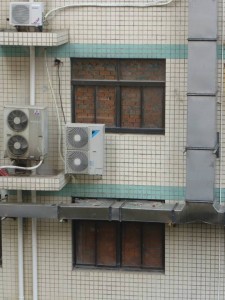
Shanghai is always changing. Chances are that by the time you read this blog, many of the sites I observed and places I frequented will have experienced changes potentially involving bulldozers and wrecking balls. The sounds of construction are ubiquitous. It’s a city where you can visit your favorite noodle restaurant Monday, find it closed Tuesday and re-opened as a French delicatessen Wednesday.
Working in Shanghai
The Chinese work experience is still influenced by years spent under absolute Communism. You see this influence when a shopkeeper does not go out of his way to provide ample customer service or makes a decision to maximize profits for this individual purchase without regard to potential revenues from future purchases. You see this influence as you enter a subway station and pass through a security checkpoint with three people assigned to direct your bag toward the X-ray machine, not really caring if you choose not to do so, and two more employees sitting behind the X-ray desk but staring more intently at their cellphones than the display. You see this influence when you enter a fast food restaurant and attempt to carry your trash to the bin, but instead you are intercepted and glared at by the employee assigned to pick up trash from tables. The trash strewn throughout the restaurant necessitates that person’s job, and he doesn’t want you taking away that necessity by throwing away your own trash. Only IKEA’s cafe has attempted to buck this trend by hanging signs that cleaning up after yourself will help keep costs low. IKEA, too, however, has learned that you must adapt to Chinese culture and tolerates clientele who choose to nap on their showroom beds for an hour or two while visiting the store.
I was told that conditions were even more distinguishable before Chinese economics became driven by “two systems.” In the 1980s it was impossible to find a hotel room. A traveler would enter hotel lobby after hotel lobby being told the hotel was filled to capacity while rarely encountering a guest. Hotel owners and staff were paid the same regardless of the amount of work they performed and handed revenues over to the government; therefore, with no incentives to increase take-home pay, they simply told most potential guests that all rooms were occupied and avoided the labor required when checking someone in and cleaning his room. In this Internet age, we didn’t have trouble locating vacancies in hotels; however, upon being unable to book on a Chinese airline’s website, I contacted customer service for assistance and was told that if I continued to have trouble I should book through Orbitz or Expedia instead of the airline.
The age of Communism has brought women into an equal standing with men in the workplace. You see women doing every job that men perform, from heavy construction and roofing to office leadership. It’s ironic, in fact, that although the one-child policy has led to China having less young women than young men, I met single independent female office managers much more frequently in China than in other countries I’ve resided. One Shanghai resident, told me, “In the past in China, the woman stayed in the home and the man worked. This was due to religious beliefs. When the Communist Party came, however, and outlawed religions, they also liberated women. Everyone went to work for equal salary. Today, it’s almost impossible for a man to support his family if he only works because taxes in China are based on a single person and not on the family. So much of his salary will go to taxes as if he were single, and he will not have enough money for the family to live a good life.”
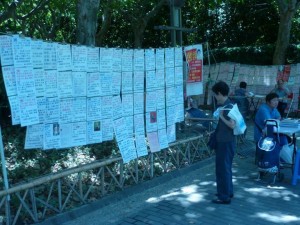
While these “Lost Women,” as single working women are known in China, are considered acceptable to younger Shanghainese who continue to marry at later ages, it is quite troublesome to older members of the family who covet relationships and family and its integral place in Chinese history. You’ll find no better place to observe this than the marriage market in People’s Square Saturday mornings. Here, parents converge and look at statistics of other singles while talking to matchmakers and excitedly calling their offspring with potential prospects. However, traditionally, a man must pay for a house and wedding expenditures before the ceremony is arranged. In Shanghai, a city more expensive than other parts of China, this brings a steep price tag of 2 Million RMB on average ($333,000 USD), equal to the salaries of 116 people in Gansu Province.
If you own a business in Shanghai, it’s also quite common to have to completely overhaul your work force following the annual Chinese New Year holiday. This is because many people who have come to the city to gain experience go home for the holiday, receive a job offer utilizing their newly obtained skills, and decide to stay home rather than return to the city of smog, high prices and homesickness. Many businesses setup a bonus scheme with payouts at this time of year, requiring the post-holiday trek back to Shanghai before an employee can receive his bonus.
Shanghai Eats

Shanghai is the first international hub I’ve lived in which I felt that I could satisfy literally any craving for any type of cuisine. Some restaurants, such as Stubb’s Bar-B-Q from Texas or my favorite American breakfast spot in Shanghai, Hillbilly Tea of Louisville, Ky., actually set up their second locations in Shanghai, and maintain only one location per hemisphere. If you’re in the mood for German, try Abbey Road. If you’re looking for a British pub to watch the Premier League game, head to The Camel. You can even find Americanized Chinese food, with the accompanying fortune cookie (yes, that’s an American invention) at the appropriately named Fortune Cookie restaurant. As in most countries outside of North America, just don’t go looking for good Mexican food.
All holidays and celebrations also come to Shanghai. We never knew that Canada had a separate Thanksgiving Day until it was celebrated in Shanghai. For our American Thanksgiving we enjoyed our turkey and dressing with a side of salsa and belly dancers at Pinnacle Peak Steakhouse.
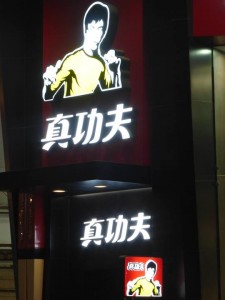
You will find a plethora of American fast food restaurants in Shanghai, particularly those owned by YUM Brands. Our apartment was within a couple of blocks from hundreds of restaurants in Xujuahui, including Subway, Dairy Queen, Carl’s Jr., Papa John’s, McDonald’s, Burger King, Pizza Hut and KFC. However, despite being your favorite American brand, they may not accept your credit card as most Chinese businesses accept only cash and possibly the Chinese credit card UnionPay. This may apply even at Pizza Hut. Speaking of Pizza Hut, most Chinese people go there not to dine on pizza but to order shrimp and steak. KFC is everywhere as is its domestic Chinese rival Dico’s. In Shanghai, Uncle Fast Food is popular and Kung Fu also appears interesting, although I found neither chain appealing.
A Shanghainese style Friday night involves a trip to a restaurant, preferably Hot Pot on most occasions, followed by a trip to Karaoke Television (KTV). A Hot Pot restaurant in China is basically like what Americans know as the Melting Pot chain, except that the Chinese would be baffled by the fact that Americans see it as a premium restaurant and actually pay extra to cook their own food at the table. Choose your mushrooms and vegetables along with some beef, pork and lamb and mix it all together in the simmering pot built into your table. If you’re at a low end restaurant, skip on the lamb. It is wildly popular in China, leading to large quantities of imports from New Zealand and fakes (also known as cat) for restaurants that do not have the means to stock it.
If you’re looking for street food, be cautious but don’t pass up on the opportunity. Our friends recommend Qibao, Shanghai’s closest “water town” with plenty of street food popular with Chinese tourists.
The nightlife in Shanghai is ever changing so we won’t mention any specific clubs here. As a Westerner, however, you’ll have plenty of businesses competing for your attention as the sight of Westerners in an establishment leads to a site being tagged as high-end and desirable for many wealthy Chinese to join them. If you find a promoter to grant your entrance, you’ll therefore pay no cover charges and have a selection of free drinks. Many of these establishments take up residence at The Bund, a row of historically significant buildings established by British settlers that today has the best view of Pudong’s famous Shanghai skyline.
A foreigner in Shanghai
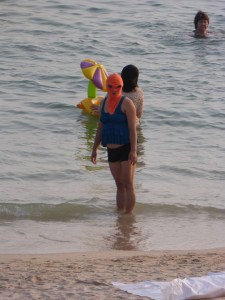
Anytime you leave the major city in China, prepare to face the paparazzi like a Hollywood star back home. People in rural areas have in their lives rarely seen Caucasians and in Chinese pop culture, whitened skin is seen as most beautiful. Chinese women will actually apply topical agents and makeups to permanently and temporarily whiten their skin. The same intention of ensuring their skin does not darken led to the popularity of the infamous Chinese facekini on China’s beaches. Whether they see you as beautiful or maybe as a huge freak, the Chinese people who have not often encountered foreigners will openly snap your pictures with their phones and cameras. Others will rush to you and ask for you to pose with them. Some may even throw their babies into your arms so that they can tell their son or daughter years later about the time he or she met a Westerner. Watch out, though, for the ‘xiao pi hai’ as babies are thrown in your direction. Diapers are not so common in China and this is the term that refers to Chinese toddlers who wear open seated pants that expose their bare buttocks so they’re ready to drop waste at any moment, possibly on that IKEA mattress mentioned above. The term was also used to describe Justin Bieber as he paraded through China, having his bodyguards carry him through attractions such as the Great Wall so that he was not “weakened.”
Shanghai is nice for international residents because you can find so many pieces of home, but if you’re in Shanghai for a short period of time, avoid those niceties and see something authentic. Take a walk down Beijing Lu rather than the overly touristy Nanjing Road nearby and you will have a completely different impression. Rather than being swarmed by men selling fake watches and exchanging money under familiar neon signs of businesses seen in every major city, you’ll see pajama-clad Shanghainese people going about their daily life.
Getting around Shanghai
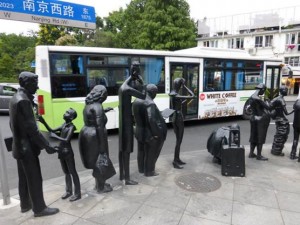
The quickest way into town from the airport is on the Maglev train but check its location versus where you’re actually headed. Chances are you’ll still have quite a distance to go once you disembark. If you don’t have much luggage and it’s early, Chinese public transportation is excellent and it’s quite easy to navigate the metro, with plentiful English announcements and maps. Do not expect this same simplicity on public buses. Westerners will quickly find that they do not have the amount of personal space that they are accustomed to and that the pushing and shoving on to the subway is not considered rude – it’s just a part of the culture. Getting off the subway often requires pushing through a horde of oncomers of all ages who rush for available seats like Western preschoolers playing musical chairs. If you take a taxi, bring the address in Chinese text or download the translational phone app as 99 percent of taxi drivers do not speak English. Counterfeit money is also an issue, so if you are riding the taxi along an obvious tourist path (airport to hotel) watch closely for scams and do not allow your 100 RMB bill to leave your sight until you are sure it has been accepted. A taxi driver may switch your bill with a fake and then claim to have no change.
The method Westerners are generally told to avoid is driving. While we have driven in most international destinations, we did not drive in China. Taxis and drivers are cheap compared to most other destinations. Meanwhile, a Westerner is seen as likely more wealthy than the average Chinese person and many people are said to see a Westerner as the potential largest payday of their life if they happen to be “injured” by him. One Chinese man told us, “In China if an old man falls in the street, no one dares to help him because there are too many liars and extortionists who will say you caused him to fall. We have a traditional story in China about a man and a wolf. The man helps the wolf again and again but finally the wolf eats the man. This is how we feel in China, that a man who does good will often have bad done to him.” Adding to the complexity, although rarely enforced, it is officially illegal for a foreigner to use a GPS device in China.
Another health hazard that Westerners often hear is the smog. It’s not so bad in summer when the clear beautiful shots of the Pudong skyline are printed in July and August issues of periodicals around the world. In the winter months, however, when little rain and heating sources are fired up across the metro area, smog descends on the city. The rest of the world has taken their pollution problems and moved them to China through the build up of industry. Needing jobs for such a large population, China has accepted those problems with open arms as a necessary evil. When smog hit record levels this winter, China “fixed” the problem by changing the scale that measures pollution so that it doesn’t reach that height again. Beijing had another solution – destroying barbecue grills.
Shopping in Shanghai
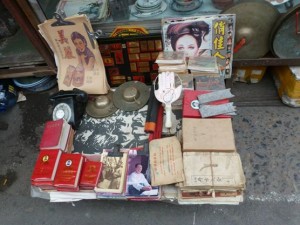
China is not so keen on intellectual property protection and the big magnet for tourists in this regard is found at 580 Nanjing Xi Lu. Here, hawkers begin negotiations at astronomical prices, possibly higher than you could purchase the real item in some cases. As you enter, you’ll pass posters adorning the entrance referring to the Chinese government’s fight to protect intellectual property with notices that the trade is illegal. This warning is basically all that the Chinese government does to comply with international trade laws. If you do decide to venture inside and test your negotiating skills for some grey area merchandise of questionable quality, check out recent prices negotiated by other customers.
Major neighborhoods in Shanghai each contain DVD stores where the latest titles (cinema and DVD releases) can be purchased for 10 RMB or less (6 RMB = 1 USD). Ironically, the ease of piracy through P2P software has put many of these pirates-for-profit out of business in less populated neighborhoods.
For other shopping needs, Shanghai likely has a market to fit your desires. The Dong Tai Road Antiques Market is a great place to find souvenirs. “Antiques,” however, may have been made last year. Many business travelers head directly to the South Bund Fabric Market and have their dimensions measured up for a suit or dress to be prepared during the next 24-48 hours. Be ready to negotiate at either place.
Rating Shanghai
I give Shanghai an 8. What city is your “world hub” where you feel that you can find absolutely anything you desire?
-Chris
